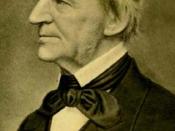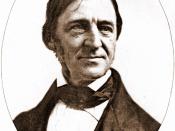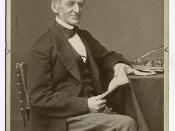Gertrude Reif Hughes calls Emerson a "vitalist" in Emerson's Demanding Optimism. Thoreau might better appreciate the term; it has a robust ring to it. She quotes The Harper Dictionary of Modern Thought as defining vitalism as "a miscellany of beliefs united by the contention that living processes are not to be explained in terms of the material composition and physico-chemical performances of living bodies" (162). This returns to Kant; it seems that to be a transcendentalist, one must first be a vitalist, although critics of transcendentalism would say "miscellany" is a correct if somewhat mild term for its rather fluid tenets. (Charles Dickens said, "I was given to understand that whatever was unintelligible would certainly be Transcendental.") But take "vitalism" one step further: animation is a vital principle in its own right, yes - but if the "material composition," etc., are the symbols of that lively spirit - then Emerson's vision of transcendentalism is clarified.
The universe is one great entity, "composed of Nature and the Soul . . . . Nature is the symbol of the spirit" (Nature).
Transcendentalism earned a reputation as a "collection of miscellany" because such variety of thought is built into the definition. Emerson and Thoreau admonish their audiences to go their own way rather than emulate the authors. Emerson declared he wanted no followers; it would disappoint him if his ideas created hangers-on rather than "independence;" he would then doubt his own theories and fear he was guilty of some "impurity of insight." Discipleship would automatically break two prime tenets of transcendentalism: first, that individualism stems from listening to one's "inner voice;" and that one's life is guided by one's intuition; societal leadership is not necessary nor desirable.
However, under that light, many written works fall under the title "transcendentalism"! After all, particularly in...


